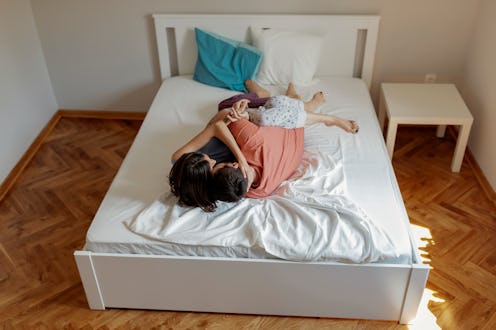Life
What To Do If You’re Anxious About Sex, According To A Psychologist & A Sex Educator

In this week's Sex IDK column, Emma McGowan, certified sex educator and writer, answers your questions about how to deal with sex and anxiety.
Q: I’d love to be able to talk to someone about sex and anxiety. For me they are very related and I've never felt comfortable talking about it because I feel like the only person who doesn't "love" sex.
Sex is an intimate, messy, emotional, physical, intense act. In fact, I’d venture a guess that most people have had anxiety about sex at some point. But if you’re having anxiety all the time, then that’s an opportunity for some growth and exploration.
"Many of us do whatever is possible in daily life to shield ourselves from being vulnerable, so it is no wonder that sex and anxiety often go hand in hand," Jennifer Mann, a psychotherapist in New York with Alma, a community for mental health professionals. "Sex involves taking layers off physically and emotionally and engaging in a different kind of connection. Not to mention there is an unavoidable internal and external pressure of performance involved."
One reason someone might feel anxious about sex is because they don’t have much experience; they're concerned about what will happen, how to do it, and how to do it “right.” If inexperience is what’s keeping you back, remember that we’ve all been there. Everyone who is currently sexually active was once not sexually active. Everyone you interact with sexually has some memory of feeling anxious or inexperienced about sex. Everyone!
With that in mind, it’s worth it to own — and own up to — your anxiety. Sometimes naming it loud is the best way to get over it. For example, if you’re getting intimate with someone you can say something like, “Oh man, I really like you so much but I get a little anxious about sex!” that can lead to a conversation about how you’re feeling and, hopefully, to some of that anxiety easing.
If the thought of saying that out loud makes you worry about the person’s reaction, consider that moment to be a gift. The way they react tells you everything you need to know about them. If they’re compassionate and listen to you and care about your feelings, score! And if they laugh or get defensive or give you some other negative response, then that’s a good sign that they’re not the right person for you.
"Talking with a trusted partner may help to get your anxieties out of your head and into the room," Mann says. "Connecting more deeply with your partner can help you feel safe when anxiety peaks. Open communication, moving slowly both physically, opening up emotionally, and deep breaths can help you ground yourself to let your anxiety move through you."
You also mention that you feel like “the only person who doesn’t ‘love’ sex.” That's a common experience for people who end up identifying as asexual. According to the Asexual Visibility & Education Network (AVEN), an asexual person doesn’t experience sexual attraction, although they might be interested in romantic relationships. (People who are interested in neither are asexual and aromantic.) Around 1% of people identify as asexual in some way.
If any of that resonates with you, you might want to do a little exploring about asexuality. But if that’s not the case — if you definitely feel sexual attraction, but get too anxious to really enjoy sex — then consider finding a sex positive therapist or even a sex therapist, if you don’t have one already. (The American Association of Sexuality Educators, Counselors, and Therapists is a great resource, as is Psychology Today.) Talking through this with a mental health professional can help you get over your anxiety about sex and anything else that's bothering you.
Read more from Bustle's 'Sex IDK' column:
- What “Protecting Yourself” In A Long-Term Relationship Really Means
- We Need To Talk About Your Sex Number
- How To Put On A Condom With Confidence